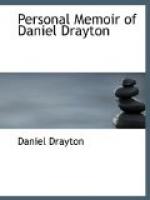In fact, the only point of the defence is, that
the United States have offered no proof that Drayton
seduced and enticed these slaves to come on board
the Pearl; and that the prisoner’s counsel are
pleased to call a gap, a chasm, which they say
you can’t fill up. It is the same gap
which occurs in every larceny case. Where
can the government produce positive testimony
to the taking? That is done secretly, in the
dark, and is to be presumed from circumstances.
A man is found going off with a bag of chickens,—your
chickens. Are you going to presume that the
chickens run into his bag of their own accord,
and without his agency? A man is found riding
your horse. Are you to presume that the horse
came to him of its own accord? and yet horses love
liberty,—they love to kick up their
heels and run. Yet this would be just as
sensible as to suppose that these slaves came
on board Drayton’s vessel without his direct
agency. He came here from Philadelphia for
them; they are found on board his vessel; Drayton
says he would steal a negro if he could; is not
that enough? Then he was here some months
before with an oyster-boat, pretending to sell
oysters. He pretended that he came for his
health. Likely story, indeed! I should like
to see the doctor who would recommend a patient
to come here in the fall of the year, when the
fever and ague is so thick in the marshes that
you can cut it with a knife. Cruising about,
eating and selling oysters, at that time of the
year, for his health! Nonsense! He was here,
at that very time, hatching and contriving that these
very negroes should go on board the Pearl. But
the prisoner’s counsel say he might have
been employed by others simply to carry them away!
Who could have employed him but abolitionists;
and did he not say he had no sympathy with abolitionists.
So much for that hypothesis. Then, he in
fact pleads guilty,—he says he expects
to die in the penitentiary. Don’t you think
he ought to? If there is any chasm here,
the prisoner must shed light upon it. If
he had employers, who were they? The prisoner’s
counsel have said that he is not bound to tell;
and that the witnesses, if summoned here, would not
be compelled to criminate themselves. But shall
this prisoner be allowed to take advantage of
his own wrong?
“As to the metaphysics of the prisoner’s counsel about possession, that is easily disposed of. Were not these slaves found in Drayton’s possession, and didn’t he admit that he took them?
“As to the cautions given you about prejudice and passion, I do not think they are necessary. I have seen no sort of excitement here since the first detection of this affair that would prevent the prisoner having a fair trial. Is there any crowd or excitement here? The community will be satisfied with the verdict. There is no question the party is guilty. I never had anything to do with a case sustained by stronger evidence. I don’t ask you to give an illegal or perjured verdict. Take the




